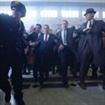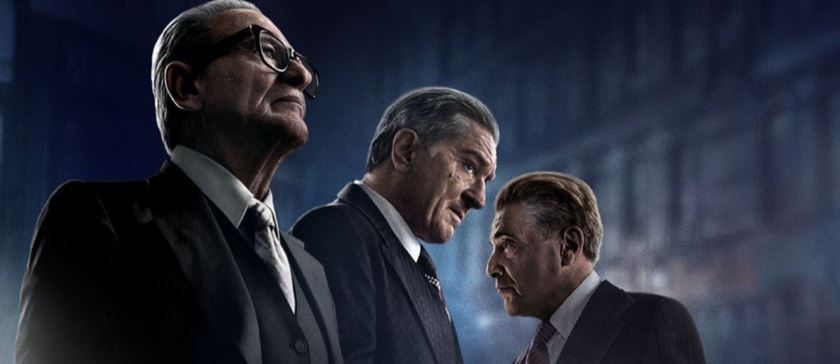With a record of violence in his filmography, it’s become typical for audiences to expect brutality from Martin Scorsese. Yet his new classic, “The Irishman,” is far from brutal in the typical ways an audience could expect from him.
It’s in “The Irishman” that the audience is made a fool for wanting to see the great spectacle of a hit on a rival of the protagonist. It’s here that audiences are gullible for rooting for the methods in which people like Frank Sheeran, morosely played by Robert De Niro in his best work of the last decade, live their lives constantly on the sidelines, letting others create his path. This is Scorsese’s newest brutality and life’s oldest brutality: the passage of time.
The film begins at its linear end, with Frank recounting the tale of his life in what seems to be the typical ramblings of an old man who’s simply reminiscing on a life well-lived.
What becomes clear as the story slowly unravels is how little Frank made of his own life; even before his initiation into mob society. He was a truck driver that delivered meat, and the only true unhappiness he faced was being rightfully accused of purposefully ruining other deliveries.

Frank and Russell share a laugh with Franks daughter Peggy (Robert De Niro, Joe Pesci, Lucy Gallina).
Photo courtesy of Tribeca Productions
He seems to have no interests, nothing to truly make of his life until he meets Russell Buffalino, played by Joe Pesci in his most restrained performance yet, and realizes the attraction of that type of power.
When Frank meets Russell, the story sets into full acceleration and never stops its brilliantly executed pacing. The three hour runtime never felt suddenly imposed as the linear past and present finally meet to expose the true darkness of “The Irishman.”
Here is a story the audience would be more than familiar with from the get-go: man joins mob, man needs to earn respect, man murders, man gets caught, man goes to jail, the end. Yet, in his 64th directorial effort, Scorsese has found a new haunting way of presenting this story.
There is a looming feeling of loss throughout the film, even as you watch Frank elevate and attain more power. It’s almost as though the direction mourns a life lived as such. This movie has you watching a man disconnected from his family. He may love them, but it’s never truly love that people crave to feel less alone.
His family barely exists to him. In fact, with their presence being so purposefully minimal to better demonstrate just how absent Frank is to them, we don’t get sentimentality or the formulaic implosion of the family because he could never mean that much to them.

Frank Sheeran escorts the infamous Jimmy Hoffa and his attorney Bill Buffalino (Ray Romano, Al Pacino, and Robert De Niro).
Photo courtesy of Tribeca Productions
The only strand of connection managed is to Jimmy Hoffa, bombastically played by Al Pacino who is clearly having a ball. While this friendship between Frank and Jimmy is genuine and real, it is constantly framed as a detriment to Frank’s “livelihood.” It is a threat to Frank’s associates that Jimmy is as loud about matters as he is, and yet he never truly feels comfortable standing for something, never feels as though it’s his place.
His passive nature proves itself all too well in the face of tragedy. He cannot and would not stand against the machine of the mob, no matter how powerful he is. It all leaves him as a man with no integrity, no family and no friends. He’s a shell that was never fulfilled.
Scorsese presents the audience with a brutal truth of living lives where you choose to remain in a submission of any kind. To lack agency is this film’s true violence, a life where all you have to show for are the secrets that haven’t mattered for decades, a life where no one, not even your daughter, would look you in the eyes. A life wasted in the worthless pursuit of power.



